MLB’s best expansion-era shortstop: Jeter, Ripken or Other?

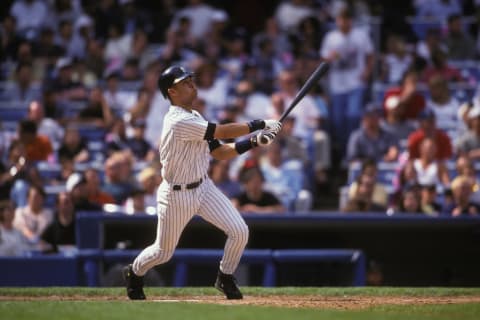
The task for the evening is to identify the best shortstop of the MLB expansion era? Who ya’ got?
Do you prefer the reliability of Cal Ripken, the artistry of Ozzie Smith, the offensive punch of Alex Rodriguez, or the breadth of skills of Barry Larkin. Perhaps you’d opt for the steadiness of Hall of Famers Alan Trammell, Derek Jeter, or Robin Yount?
MLB Network personalities Brian Kenny and Bob Costas wrestled with that complex topic during the latest installment of the network’s ‘Top 10 Right Now’ Tuesday. That episode included a segment rating post-1969 shortstops.
Before assessing how accurate the Kenny and Costas lists were, here are their respective top 10s:
Kenny Costas
1 Cal Ripken Cal Ripken
2 Derek Jeter Derek Jeter
3 Robin Yount Ozzie Smith
4 Ozzie Smith Alex Rodriguez
5 Alex Rodriguez Barry Larkin
6 Alan Trammell Robin Yount
7 Barry Larkin Alan Trammell
8 Nomar Garciaparra Omar Vizquel
9 Troy Tulowitzki Nomar Garciaparra
10 Omar Vizquel Francisco Lindor
The expert consensus places shortstop at the top of the positional hierarchy. Our six ratings criteria reflect the position’s varying demands, with two of them fully oriented to the defensive spectrum. When all six categories are assessed, the player with the average ordinal score closest to a perfect rating of 1.0 is the winner.
The criteria are: 1. Five-season peak performance with OPS+ as the yardstick; 2. Cumulative OPS+ over the course of their careers; 3. Career MVP shares; 4. Career Defensive Wins Above Replacement; 5. Assists per 162 games; 6. Baserunning runs.
Alphabetically, the 30 nominees are: Elvis Andrus, Mark Belanger, Xander Bogaerts, Larry Bowa, Dave Concepcion, Shawon Dunston, Tony Fernandez, Rafael Furcal, Nomar Garciaparra, Ozzie Guillen, Derek Jeter, Barry Larkin, Francisco Lindor, Edgar Renteria, Cal Ripken, Alex Rodriguez, Jimmy Rollins, Bill Russell, Marcus Semien, Andrelton Simmons, Ozzie Smith, Trevor Story, Miguel Tejada, Garry Templeton, Alan Trammell, Troy Tulowitzki, Omar Vizquel, Walt Weiss, and Robin Yount.
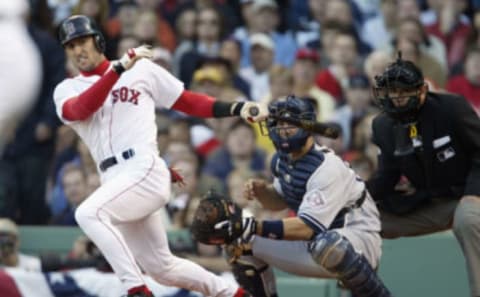
Five-season peak performance
This criteria is simply the player’s best five-season average OPS+.
Here are the 10 best peak averages among the 30 MLB candidates.
Rank Shortstop Seasons Average
1 Alex Rodriguez 2005-2009 154.2
2 Troy Tulowitzki 2010-2014 138.2
3 Nomar Garciaparra 1998-2002 138.0
4 Robin Yount 1980-1984 137.2
5 Barry Larkin 1994-1998 133.6
6 Cal Ripken 1982-1986 130.4
7 Derek Jeter 1998-2002 128.6
8 Alan Trammell 1983-1987 127.8
9 Miguel Tejada 2002-2006 124.8
10 Xander Bogaerts 2016-2020 122.4
Rodriguez piled up his big offensive numbers during the height of the steroid era, perhaps calling into question their legitimacy. As with other installments of this series, the data is calculated objectively, omitting such subjective considerations. Feel free to downgrade him at your discretion. (As we will later see, our MLB-TV experts did precisely that.)
The surprise here is Tulowitzki. He had only a half dozen truly imposing seasons – and they came at Coors Field. But there’s no getting around the 170 OPS+ he piled up in 2014, when he batted .340, albeit in just 91 games.
Between 1998 and 2000, Garciaparra piled up scores in the 140 to 160 range, leading to his third place standing. Behind them come the other legit contenders: Yount, Larkin, Ripken, Jeter and Trammell.
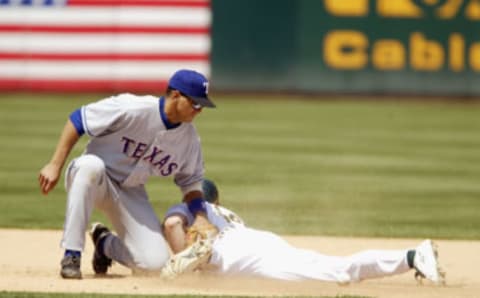
Cumulative career OPS+
This category, which is simply the sum of each shortstop’s OPS+ values, is different from the standard career OPS+, which is essentially the player’s career average. Cumulative career OPS+ is designed to reward longevity. It is a counter-balance to the first, peak-performance oriented, category.
Here’s the top 10.
Rank Shortstop Cumulative OPS+
1 Alex Rodriguez 2,806
2 Robin Yount 2,259
3 Cal Ripken 2,247
4 Barry Larkin 2,172
5 Derek Jeter 2,123
6 Alan Trammell 2,020
7 Omar Vizquel 1,869
8 Shawon Dunston 1,660
9 Dave Concepcion 1,625
10 Ozzie Smith 1,620
There are two clear distinctions in this category. The first is between Rodriguez and everybody else. The second, a 200-point gap, separates Yount, Ripken, Larkin, Jeter, Trammell and Vizquel from the field.
Rodriguez’s primacy is no surprise. He produced six seasons with an OPS+ of 150 or better, topping out at 176 in 2007.
As would be expected, shortstops who are still active are effectively penalized in this category since they continue to compile OPS+. There are six of them in this list of 30, and they form a cluster at the bottom of the category. Andrus, at 1,009, ranks highest, and he’s only 23rd.
Story, at a cumulative OPS+ of just 570, currently stands last amongst MLB shortstops. That will change with time.
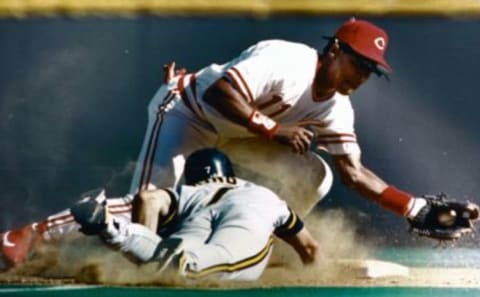
MVP shares
Peer and contemporary recognition is one important tool for measuring a player’s skill. This category is designed to factor that into the overall evaluation. For this combined offense-defense position, the best choice is MVP shares.
Each player’s MVP share is based on the percentage of available MVP votes he received during the course of his career.
Here’s the ranking of the 10 highest shares among the 30 players who were considered.
Rank Shortstop Shares
1 Alex Rodriguez 5.23
2 Derek Jeter 2.77
3 Cal Ripken 2.31
4 Robin Yount 1.80
5 Nomar Garciaparra 1.67
6 Miguel Tejada 1.41
7 Alan Trammell 1.22
8 Barry Larkin 1.10
9 Jimmy Rollins 0.91
10 Francisco Lindor 0.90
Only seven times has a shortstop been named MVP since the start of the MLB expansion era. Perhaps not surprisingly, those seven wins are all represented within this top 10.
Despite being the only one to win twice as a shortstop, (1983 and 1991), Ripken only rises to third in total shares because he had just one other MVP finish among the top 10.
Rodriguez won in 2003, then won again as a third baseman in 2005 and 2007. He had seven other top 10 finishes, including runners-up in 1996 and 2002.
The other shortstop MVPs were Yount in 1982, Larkin in 1995, Tejada in 2002 and Rollins in 2007.
If there’s a loser in this category it’s probably Vizquel. With just a 0.01 MVP share, he ranked 26th on the list. That standing will hurt him in the final accounting.
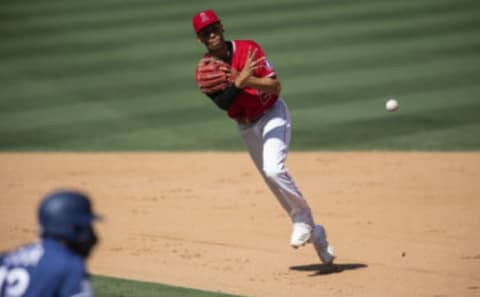
Defensive War
The defensive component at shortstop is a significant portion of a player’s overall value.
Today, the best category for rating shortstop play is probably Outs Above Average. But data for that calculation is not available for the pre-Statcast era, leaving Defensive War as the next best choice.
It reflects the number of runs a player is projected to have saved his team due to his defensive play over the course of his career.
Here are the top 10 in dWAR for shortstops since 1969.
Rank Shortstop DWar
1 Ozzie Smith 44.2
2 Mark Belanger 39.5
3 Cal Ripken 25.6
4 Omar Vizquel 29.5
5 Andrelton Simmons 26.6
6 Ozzie Guillen 23.0
7 Alan Trammell 22.7
8 Dave Concepcion 21.4
9 Bert Campaneris 21.1
10 Bill Russell 19.4
Suddenly the big-name offensive leaders don’t look so good. Neither Rodriguez nor Jeter crack the category top 10; in fact Rodriguez rates only 19th and Jeter – with a minus-9.4 career score – stands dead last among the 30 shortstops of the MLB expansion era.
Contrary to the judgments of Costas and Kenny, that fact alone just about kills Jeter’s chances of ranking at or near the top in the overall evaluation.
Smith and Ripken are the category’s big winners. Elsewhere, the category top 10 is populated by guys never viewed as an all-time great, fellows like Belanger, Simmons, Guillen and Russell.
It is a testimony to Simmons’ defensive brilliance that, at age 31 – he ranks among the era’s five best in a career category. Simmons has already had three seasons during which he was a +plus four dWAR player or better.
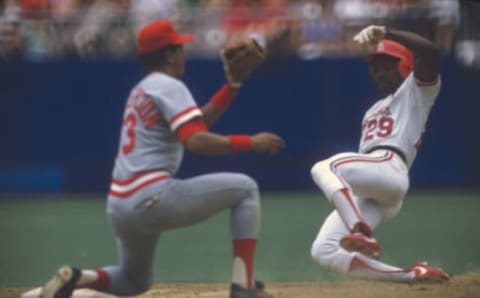
Assists per 162 games
The MLB shortstop position requires a fielder not merely to get to a lot of plays, but also to make those plays efficiently. That makes his assist total a vital measuring tool of positional excellence.
The tool in use here is assists per 162-games as opposed to peak or career assist totals. Using that approach provides a balance between players who piled up high assist totals over more lengthy careers compared with those who were better for shorter periods. It also allows us to assess players based purely on their play at shortstop, an important distinction when evaluating players such as Yount, Rodriguez and Ripken who made mid-career position moves.
With that as an understanding, here are the top 10 shortstops based on their 162-game career assist averages at the position.
Rank Shortstops Per-162 gms.
1 Ozzie Smith 540.32
2 Robin Yount 525.10
3 Bill Russell 514.58
4 Larry Bowa 499.93
5 Garry Templeton 498.29
6 Troy Tulowitzki 496.86
7 Cal Ripken 491.00
8 Dave Concepcion 490.46
9 Rafael Furcal 487.67
10 Miguel Tejada 483.17
Again, defensive shortcomings make players such as Rodriguez and Jeter noteworthy by their absence from the category top 10. At 400.15 assists per 162 games, Jeter ranks 29th among the 30. Rodriguez, at 459.13, is better, but still bottom half.
Smith and Yount are the clear category winners, taking the first and second spots. The rest of the top 10 is populated by surprises: Russell, Bowa, Templeton and Furcal.
As noted earlier, Ripken and Yount are rated in this category only for the games they played at shortstop.
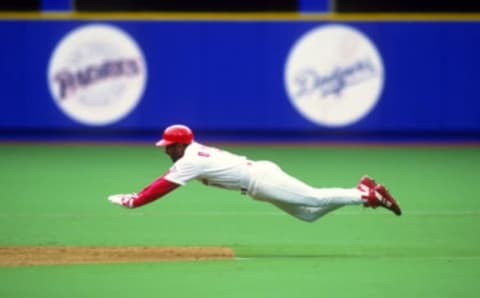
Baserunning runs
As with second base, shortstop is a position that values players for their ability to maneuver their teams into run-scoring situations. Although less prominent a task in the modern game, that has historically applied in profound ways to shortstop. Here’s the proof: Our 30 candidates averaged more than 25 baserunning runs during the course of their careers.
Ten of them topped 40 baserunning runs.
Here’s the category top 10
Rank Shortstop Runs
1 Barry Larkin 81
2 Ozzie Smith 80
3 Jimmy Rollins 67
4 Bert Campaneris 57
5 Robin Yount 56
5 Alex Rodriguez 56
5 Derek Jeter 56
8 Rafael Furcal 53
9 Elvis Andrus 43
10 Larry Bowa 41
There is a glaring disparity of performance in this category, and it works to the specific disadvantage of one contender for the top spot. With minus-five baserunning runs, Ripken measures out as the worst runner of any of the 30 MLB players in contention.
Granted, the Orioles weren’t paying Ripken to run. But literally every other of the game’s best shortstops did it better than him …and several did it far, far better.
Larkin and Smith project themselves back into overall contention with their first and second place performances in this category. Yount, too, fares well.
And after their rather desultory showings in the fielding categories, Jeter and Rodriguez both tie Yount for the fifth position, re-establishing themselves as legit top 10 factors.
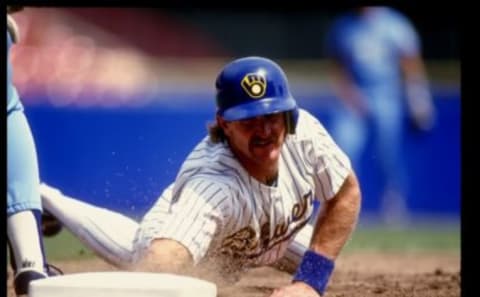
The final tabulation
The tabulation below is based on the average ordinal placement of each of the 30 MLB shortstops in all five categories. A score of 1.0, indicating a first place rank in all six categories, would be perfect. The list also shows the shortstop’s standing on the Kenny and Costas lists.
Rank Shortstop Ordinal Avg Kenny Costas
1 Robin Yount 6.83 3 6
2 Alex Rodriguez 7.33 5 4
3 Ozzie Smith 7.83 4 3
4 Cal Ripken 8.67 1 1
5 Alan Trammell 8.83 6 6
6 Barry Larkin 9.17 7 5
7 Dave Concepcion 12.17 NR NR
8 Bert Campaneris 12.50 NR NR
T9 Derek Jeter 13.00 2 2
T9 Troy Tulowitzki 13.00 9 NR
Costas did a curious spur-of-the-moment thing on air, dropping Rodriguez three places after initially selecting him No. 1. He did so after Kenny reminded Costas that he had previously punished other players who had been linked to performance enhancing substances.
The other interesting observation, by Kenny, was that experts tend to under-value Yount. By this data, he then under-valued Yount, listing the ranking’s No. 1 player only third.
How precisely did Yount wind up No. 1, especially given that he made a mid-career move to the outfield? In a closely contested competition, he did not lead any category. But he was top five in five of them, ranking fourth in peak OPS+, second in cumulative OPS+, fourth in MVP shares, second in assists per 162-games, and fifth in baserunning.
That allowed him to survive a 24th place finish in defensive WAR, his lone weakness.
Rodriguez led the two hitting categories plus MVP shares. But he was lower-half in both of the defensive categories.
Smith led both of the defensive categories and was second to Larkin in baserunning. But he ranked only 21st in peak OPS+ and was also outside the top 10 in MVP shares.
As for Ripken, his last-place finish in baserunning killed his candidacy, which produced ranks of sixth, third, third, third and seventh in the other five categories.
Kenny identified eight of the actual top 10, and Costas found seven of them. Obviously both discounted Ripken’s baserunning shortcomings in rating him at the top.
They also ignored Jeter’s defensive shortfalls, while paying no heed at all to the strength of both Concepcion and Campaneris in any category not directly related to hitting the ball.
Hank Aaron's place on the hitting Mt. Rushmore. dark. Next
Concepcion was top 10 in both defensive-oriented categories. Campaneris ranked fourth in baserunning and ninth in defensive WAR, his only real weak spot being peak OPS+.